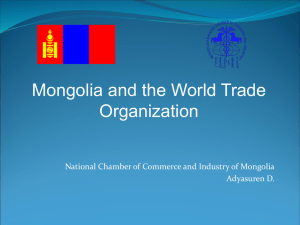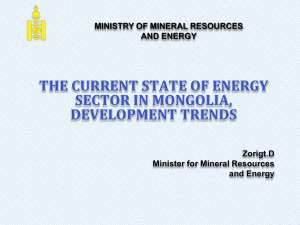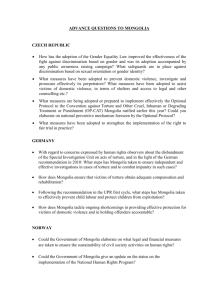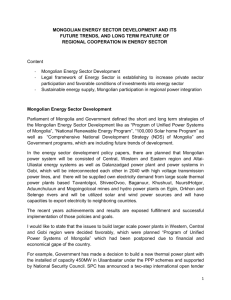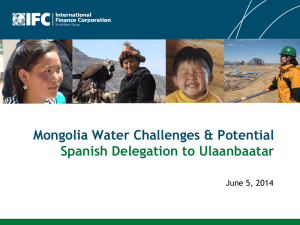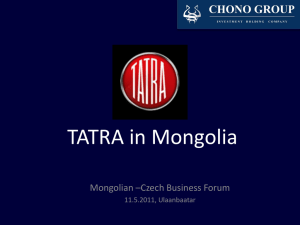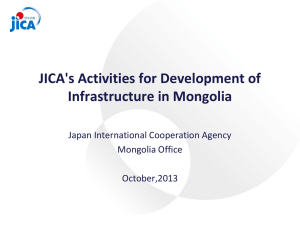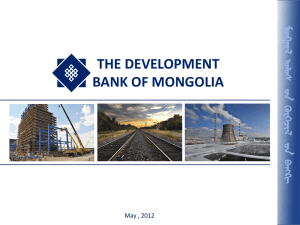Document
advertisement
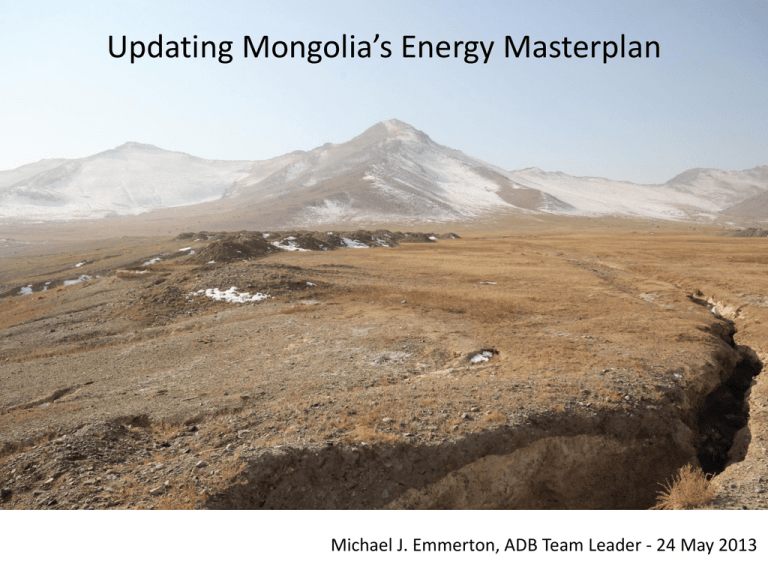
Updating Mongolia’s Energy Masterplan Michael J. Emmerton, ADB Team Leader - 24 May 2013 Energy Masterplanning Challenges • • • • Large land area Sparse population on the move Minerals Extraction (mines) Industrialization • Natural Fibres • Meat and milk • Oil refining • Minerals processing • Industrial Parks (smelters) Mongolia’s 15 Strategic Mineral Deposits Mongolia’s Potential Electricity Intensification Mongolia’s Potential Demand Growth Combined Heat & Power Plants Myth no. 1 – Mongolia’s CHP Plants are inefficient • Compared to modern plant • Water consumption high • Pollutants high • Thermal Efficiency • CHP4 - total thermal efficiency ~ 55% • Power-to-Heat ratio ~0.29 CHP Cogeneration & Condensing Products Myth no. 1 – Mongolia’s CHP Plants are inefficient • CHP4 • Total thermal efficiency – 55% • New CHP in Mongolia • Heat production efficiency – 89% • Electric power efficiency – 46.7% • Total thermal efficiency – 59.7% • CHP in continuous cogeneration mode • Total thermal efficiency – 89% Taishir Hydropower, Gobi Altai – 11MW Myth no. 2 – Hydropower is best choice to serve Mongolia’s peak energy demand • All previous studies have compared a hydropower plant to a ‘hypothetic’ gas turbine operating at time of peak load • Cost estimates have been varied and generally too low Mongolia’s Expected HPP Capital Costs Capacity Production MW Project Egiin Sheuren Burin Artset Orkhon ErdeneBurin Chargait Maikhan UB Pump S GWh Hydraulic Head Crest Cost Length (m) $/kW (m) 220 205 161 118 100 412 957 760 553 219 73 63 52 57 65 710 700 -1,200 1,700 1,400 495 2,827 2,969 3,251 3,362 3,353 64 243 85 - 4,154 15 12 100 68 46 (102) 24 417 224 570 no dam - 3,716 1,772 2,473 Myth no. 2 – Hydropower is best choice to serve Mongolia’s peak energy demand • Design optimization shows that an HPP c constructed on Sheuren river system has optimal design, from cost and energy perspective, if • 390MW • 1,260GWhr per annum • Capacity factor ~ 55% Sheuren HPP (300MW) Despatch May 2022 Newcom Salkhit Windpark – 50MW Myth no. 3 – Mongolia’s Wind & Solar resources can be exploited to supply Asia • Wind and solar PV suffers from intermittency • In Mongolia there is little wind in winter months • Across vast distances in Mongolia, and with a small capacity system, controlling a transmission grid with significant intermittent power sources is a complex undertaking Diurnal Net Power Production (200MW Wind) Economics of Energy Technology in Mongolia Investment in Energy Supply in Mongolia • Heat Supply • A new CHP plant is the most economical heat supply for UB city • Large Heat Only Boiler (HOB) is needed to bridge from now to 2018 • Total investment in heat supply will be of the order of $3.5B (money of the day basis). • Half of the Aimag heating systems need replacement within the next five years at a cost of around $ 150m. Investment in Energy Supply in Mongolia • • • • Hydropower in 2022 Capacity 390MW, min 1,000GWh p.a. Est. Cost $900m Benefits • Reduced operating costs • More wind farms • Provides opportunity for Mongolia to develop the capability to control system frequency across its vast transmission network Investment in Energy Supply in Mongolia • T&D Networks • Strengthen to reduce energy losses, improve reliability • Economic to supply mines up to 100MW if within 300km of existing grid • In time create a Mongolian super-grid at 400kV to support industrial centres Investment in Transmission & Distribution Support Clean Energy Research • Under Mongolian conditions • Renewable energy technologies - solar heating schemes, geothermal schemes • Involve the young and brightest engineers in interesting projects that support Mongolia’s future direction



